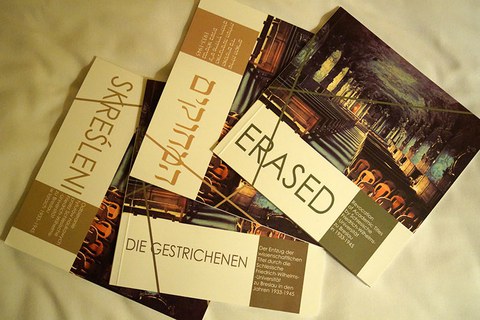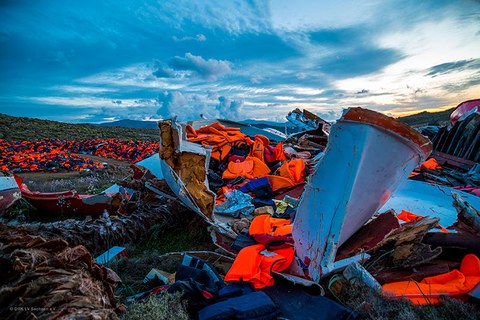In the thick of it
(Interview from 2017)
Dagmar Möbius
As a child growing up in Görlitz, Kai Kranich imagined setting up museums. Later, he studied politics and history. And although he has since turned his back on research and academia, he is still helping to write contemporary history. He has even received an award for it.

Kai Kranich (center) at the presentation of the 2016 PR-Bild Award in Hamburg; on the left is Jens Petersen, Head of Corporate Communications at news aktuell, and on the right presenter Jule Gölsdorf
The winners of the PR-Bild Award (PR image award) were announced in Hamburg in early November 2016. Among the guests was Kai Kranich. What he did not know until the event was that his photo "Lesbos – Friedhof der Rettungswesten" ("Lesbos – A graveyard of life vests") had won 1st place in the NGO category. "I was really pleased, not least because many professional photographers had entered pictures." Now, it's back to the daily grind. In April 2015, he became director of communications at DRK Landesverband Sachsen. When he started in this role with the German Red Cross, he could not have imagined what would soon face him: the refugee crisis. After many years of academic work and more than five years as project manager at FORUM TIBERIUS – International Forum for Culture and Business, Dresden – he describes his application as a "rational decision."
A course close to his heart
His first great passion was history. "I would plan museums in my head when I was a kid," the 34-year-old recalls. To improve his job prospects, he added political science to modern and contemporary history and economic and social history, "where my heart really lay." Archaeology or law were possible alternatives. He had a choice of Berlin, Leipzig, and Dresden, and opted for TU Dresden. Several members of his family had already studied there. "Everyone else in my family has done something related to horticulture; I'm the black sheep, so to speak," he laughs. An internship at the Saxon Ministry of the Interior finally cemented his interest in student life in the "Florence of the Elbe." He still enthuses today about the absolute freedom he had in managing his time, and the independence and organizational skills he learned – in short, "the best time of your life, when you’re not yet concerned with material matters." And when he even had time for volunteering. Kai Kranich was a member of the Student Council of the Faculty of Arts, Humanities and Social Science, and launched and ran the German-Polish "Studentenstammtisch" (regular student meet-up) at TU Dresden between 2006 and 2008. Between 2002 and completing his Magister degree in 2010, he spent a period abroad studying European and Polish history, politics, and economic cooperation at the University of Wrocław.
Systems thinking and an unexplored archive
"The combination of politics and history is ideal because there is a strong element of methodology," says Kai Kranich. Totalitarian systems particularly interested him. Werner J. Patzelt, Professor of Political Systems and Comparative Politics, was a tough but excellent teacher. "He demanded a lot, especially in terms of abstract thinking. And he always said that German humanities scholars had to be able to familiarize themselves with any subject, even by teaching themselves as necessary." With Professor Hans Vorländer, Kai Kranich learned not only about the history of political ideas, but "also about the thinking of the time and what emerged from it." He has his doctoral supervisor Professor Peter E. Fäßler, now at the University of Paderborn, to thank for introducing him to fascinating topics beyond the field economic and social history. "He taught me how to write clearly and comprehensively – a skill that still benefits me today," says a grateful Kranich. Understanding the theory was not always easy. "You see something, put a puzzle together, and interpret it. It can take some time to get your head around it." How anyone can fail in history is incomprehensible to him. "You have to have a passion for it," he says. His enthusiasm truly became a passion when, after completing his fundamental studies at the University of Wrocław, he "found an untouched archive" on which he "labored for ten years." His research for his final-year dissertation on the revocation of 262 doctorates held by Jewish scientists received national attention, and helped lead to a symbolic rehabilitation process. Kranich submitted his doctoral thesis on the rise of engineering under National Socialism, explored using the example of Technische Hochschule Breslau (the former name of Wrocław University of Science and Technology), a year ago. A number of scholarships enabled him to study and complete his doctorate without taking on a part-time job. "It's not rocket science. You have to deliver, of course, but it was a unique experience."

Kai Kranich wrote his Magister thesis at TUD, advised by Professor Werner J. Patzelt and Professor Peter E. Fäßler. Kranich's research findings on the "forgotten doctors" were published in 2011 in German, English, Polish, and Hebrew.
The refugee crisis: contemporary history
Kai Kranich says he doesn't need his subject-specific expertise in his current job. He does, however, need to understand political context and environments for his work in a global non-profit organization.
The problem-solving skills he acquired at university help him every day. He has not had traditional PR training, but experience in press and public relations has been a constant throughout his academic and professional career – from the school newspaper to various internships in state ministries. During the wave of refugees, he was out with journalists in Saxon camps every day. Looking back, he says that "making the crisis explainable is so relevant in terms of contemporary history. You're doing something really important; you're in the thick of things. Sometimes to the point of physical and mental exhaustion. He has often had to make decisions on his own, and is grateful for the trust placed in him by his boss and for the many excellent partnerships, including with TU Dresden. "The year 2015 was packed enough for three years," he says, looking back.
A passion for photography – but not at any cost
Kai Kranich has visited the opening of almost every reception center for asylum seekers run by the German Red Cross in Saxony. That includes one in Heidenau. With his safety helmet on. Although he likes taking pictures, in this case, he had inhibitions. "The helpers were treating the injured after riots in the medical facility at the reception center. A young man in a 'F*ck asylum' t-shirt thanked us with tears in his eyes for our help. I couldn’t bring myself to point my lens at him," says the professional communicator.
Nowadays, there are "1000 things" on his desk every day. From support for the disabled, integration, and disaster control to water rescue. "I have to sound things out – where is there a good story, where is there an emergency?" he explains, praising his "great team." Several of his seven colleagues are also graduates of TU Dresden. The organization has produced a "Refugee Guide Book," and they are currently developing refugee communication material in eight to eleven languages for 20 different nations. The photo that would later win the "PR-Bild Award" was submitted by intern and political scientist in the making Caroline Brückner.
The German Red Cross is always looking for volunteers. People interested in a long-term commitment are given tailored training and deployed according to their skills.

"Lesbos – Friedhof der Rettungswesten" ("Lesbos – A graveyard of life vests") was awarded 1st place in NGO category for the 2016 "PR-Bild Award"
A personal experience on Lesbos
The photo was taken during an information-gathering and training mission in March 2016 on the Greek island of Lesbos. It is the most impressive in a series of pictures. "The motif of the life vests does not play on personal destinies, but it gives expression to the human dimension" was the praise from the jury. "At that time, no more refugees were landing, the coastline was sealed off; the Balkan route closed. Maybe I didn't want to experience that," admits Kai Kranich. Yet he still voluntarily participated in an exercise. "We took a boat out to sea at midnight. All those on board except me were lifeguards with the relevant equipment. Search parties were sent to find us. Then the boats began to flood; the engine failed; it was dark and cold," he says. He understood what fear someone must feel who does not know they have three search teams nearby. "Your perception is affected and you focus on fundamental things; I was holding onto a rope." He has great respect for all the helpers. Even today, he has mental images of the many shipwrecks on Lesbos. "There were so many that some of them were set on fire to clear them away."
Contact:
Kai Kranich
Leiter Kommunikation
DRK Landesverband Sachsen e.V.
Bremer Straße 10d
01067 Dresden
Germany
Tel: +49 351 4678 104
Email
Websites:
